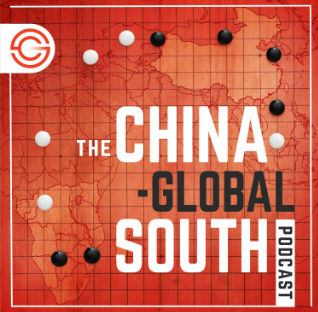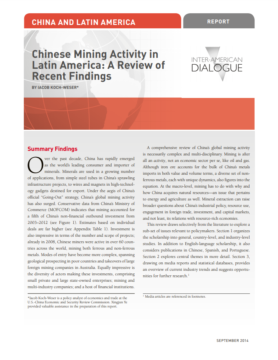The Politics Of Disaster Relief
After a 7.0 magnitude earthquake struck Haiti, the aftershock reached China in ways that few anticipated.The earthquake forced Chinese leaders to navigate the tricky politics of disaster relief.
Margaret Myers, director of the Asia & Latin America Program, joined the China Global South Project podcast to discuss key findings from the new Inter-American Dialogue report, “New Infrastructure": Emerging Trends in Chinese Foreign Direct Investment in Latin America and the Caribbean.
“There has been interest in investing in sectors of strategic importance—for whatever reason—to China for many years now, for over two decades. In the early years the projects of interest were largely focused on China’s own food and energy security considerations, so we saw a lot of investment in agriculture-related projects—across the supply chain, in agricultural logistics, for example, and processing, and transport of food. Also in energy assets—in addition to the oil-backed loans that were given to oil producing nations (Venezuela and Ecuador, for example), we saw some actual investments in oil fields and acquisitions of oil and gas companies.”
“So, investment has been a feature of China’s economic engagement with the region for many years, but it has changed over time, consistent with China’s shifting interests and shifting economic realities. And indeed, that’s what we’re seeing now in what I would call a new phase in China-Latin America economic relations.”
"China has been far more intensively focused on industries that it views as directly related to or aligned with its own development-related objectives—that is, its ability to grow at at least moderate rates in the coming years. And the focus has been on broadly innovation-related sectors—those sectors that will help China to upgrade economically and to be able to compete with those countries that have, at this point, become high-income countries, and which have avoided the middle-income trap, which is something that China has been very preoccupied with for a number of years."
"In several policy documents of late we've seen reference to the term 'new infrastructure' as comprising these various innovation related sectors that China ought to be prioritizing—China and its companies, that is."
After a 7.0 magnitude earthquake struck Haiti, the aftershock reached China in ways that few anticipated.The earthquake forced Chinese leaders to navigate the tricky politics of disaster relief.
Despite reports in recent months that Mexican manufacturing is experiencing a resurgence, Mexico’s industrial sector faces tremendous challenges.
China has rapidly emerged as the world’s leading consumer and importer of minerals.
 The China Global South Project Podcast
The China Global South Project Podcast
